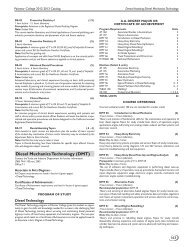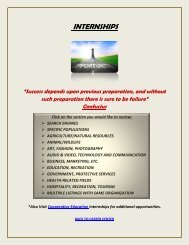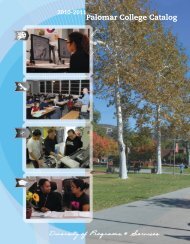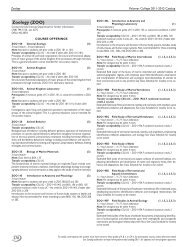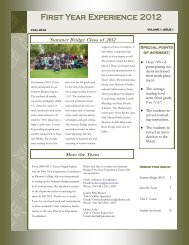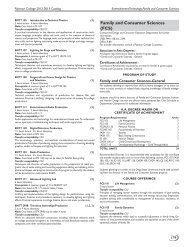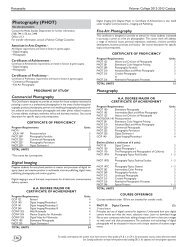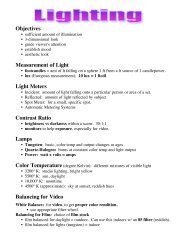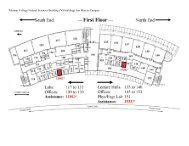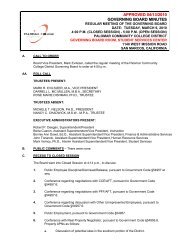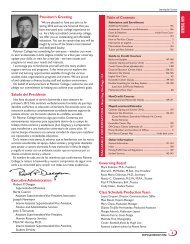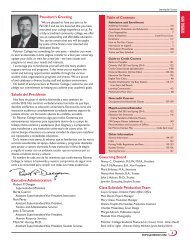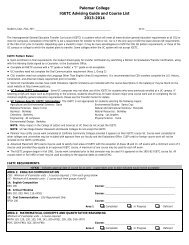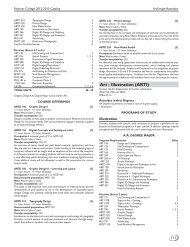Download the complete catalog - Palomar College
Download the complete catalog - Palomar College
Download the complete catalog - Palomar College
Create successful ePaper yourself
Turn your PDF publications into a flip-book with our unique Google optimized e-Paper software.
<strong>Palomar</strong> <strong>College</strong> 2010-2011 Catalog<br />
Computer Science and Information Systems: Information Technology<br />
use of word processing, spreadsheet, database and presentation graphics software.<br />
The Microsoft Office Suite will be taught using Word, Excel, Access and<br />
PowerPoint.<br />
CSIT 130 Windows Vista (1.5)<br />
1 hour lecture - 1½ hours laboratory<br />
Note: May be open entry/open exit<br />
Transfer acceptability: CSU<br />
Overview of Windows Vista operating system. Explore <strong>the</strong> resources provided<br />
by <strong>the</strong> Windows Vista operating system; manage files, documents and folders; run<br />
programs and gadgets; explore communication and scheduling; explore <strong>the</strong> Internet;<br />
set up printers; customize Windows Vista; maintain security; and manage<br />
Windows Vista.<br />
CSIT 131 Word (1.5)<br />
1 hour lecture - 1½ hours laboratory<br />
Note: May be taken 2 times<br />
Transfer acceptability: CSU<br />
Intended for individuals seeking <strong>the</strong> fundamental and advanced skills of Microsoft<br />
Word word processing software. Prepares individuals who are seeking to become<br />
a Microsoft Proficient Specialist and Microsoft Word Expert Specialist.<br />
CSIT 132 Excel (1.5)<br />
1 hour lecture - 1½ hours laboratory<br />
Note: May be taken 2 times<br />
Transfer acceptability: CSU<br />
Intended for individuals seeking <strong>the</strong> fundamental and advanced skills of Microsoft<br />
Excel spreadsheet software. Prepares individuals who are seeking to become a<br />
Microsoft Excel Proficient Specialist and Microsoft Excel Expert Specialist<br />
CSIT 133 PowerPoint (1.5)<br />
1 hour lecture - 1½ hours laboratory<br />
Note: May be taken 2 times<br />
Transfer acceptability: CSU<br />
Intended for individuals seeking <strong>the</strong> fundamental and advanced skills of Microsoft<br />
PowerPoint graphics software. Prepares individuals who are seeking to become a<br />
Microsoft PowerPoint Expert Specialist.<br />
CSIT 134 Outlook (1.5)<br />
1 hour lecture - 1½ hours laboratory<br />
Note: May be taken 2 times<br />
Transfer acceptability: CSU<br />
Introduction of fundamental and advanced skills of Microsoft Outlook software.<br />
Helps prepare individuals who are seeking to become a Microsoft Outlook Proficient<br />
Specialist and Microsoft Outlook Expert Specialist.<br />
CSIT 135 Access (1.5)<br />
1 hour lecture - 1½ hours laboratory<br />
Note: May be taken 2 times<br />
Transfer acceptability: CSU<br />
Intended for individuals seeking <strong>the</strong> fundamental and advanced skills of Microsoft<br />
Access database software. Helps prepare individuals who are seeking to become<br />
a Microsoft Access Proficient Specialist and Microsoft Access Expert Specialist.<br />
CSIT 140 Online Social Networks (1.5)<br />
1 hour lecture - 1½ hours laboratory<br />
Focuses on <strong>the</strong> utilization of social networks to connect with colleagues, customers,<br />
family, and friends as well as <strong>the</strong> dangers and benefits of online social<br />
networking. Additional focus on building professional communication channels<br />
with Facebook and Twitter utilizing third-party tools. O<strong>the</strong>r social networking<br />
forms, such as online gaming and alternate lives in virtual worlds will be explored.<br />
CSIT 170 Visual Basic I (4)<br />
3½ hours lecture - 1½ hours laboratory<br />
Transfer acceptability: CSU<br />
Design, create, test and run computer applications using Visual Basic. Emphasis<br />
is on learning <strong>the</strong> fundamentals of <strong>the</strong> Visual Basic interface and how to solve<br />
problems using structured design logic and <strong>the</strong> sequence, decision and repetition<br />
procedural language control structure. Selected additional features of <strong>the</strong> Visual<br />
Basic interface and procedural language are included to provide a foundation for<br />
<strong>the</strong> study of more advanced courses.<br />
CSIT 180 C# Programming I (3)<br />
2½ hours lecture - 1½ hours laboratory<br />
Transfer acceptability: CSU; UC<br />
Provides <strong>the</strong> knowledge and skills necessary to use <strong>the</strong> C# programming language<br />
in <strong>the</strong> .NET Framework. Build Windows applications and server-side programs;<br />
access data with ADO.NET; use C# with Web Forms and .NET CLR.<br />
CSIT 197 Topics in Information Technology (.5 - 4)<br />
Units awarded in topics courses are dependent upon <strong>the</strong> number of hours required<br />
of <strong>the</strong> student. Any combination of lecture, laboratory, or lecture/laboratory may be<br />
scheduled by <strong>the</strong> department. Refer to Class Schedule.<br />
Note: May be taken 4 times<br />
Transfer acceptability: CSU<br />
Topics in Information Technology. See class schedule for specific topic offered.<br />
Course title will designate subject covered.<br />
CSIT 270 Visual Basic II (4)<br />
3½ hours lecture - 1½ hours laboratory<br />
Prerequisite: A minimum grade of ‘C’ in CSIT 170<br />
Transfer acceptability: CSU<br />
An intermediate-level programming language which provides for building special<br />
purpose Windows applications using <strong>the</strong> Graphical User Interface of Windows.<br />
Includes extensive practice using programming logic control structures in designing<br />
algorithms and a wide array of Visual Basic objects in implementing <strong>the</strong> threestep<br />
approach to building Windows applications in Visual Basic.<br />
CSIT 271 Visual Basic III (4)<br />
3½ hours lecture - 1½ hours laboratory<br />
Prerequisite: A minimum grade of ‘C’ in CSIT 270<br />
Transfer acceptability: CSU<br />
Advanced course in Visual Basic programming. Special emphasis will be placed on<br />
<strong>the</strong> application of <strong>the</strong> Visual Basic language to solve business problems including<br />
requirements definition, design, construction, testing, and documentation. Multiple<br />
forms, objects, controls, object linking and embedding (OLE), and <strong>the</strong> use of <strong>the</strong><br />
data control object to interface with databases external to Visual Basic will be<br />
covered.<br />
CSIT 280 C# Programming II (3)<br />
2½ hours lecture - 1½ hours laboratory<br />
Prerequisite: A minimum grade of ‘C’ in CSIT 180<br />
Transfer acceptability: CSU; UC<br />
Provides intermediate-level knowledge and skills necessary to use <strong>the</strong> C# programming<br />
language. Topics include language syntax, data types, operators, exception<br />
handling, casting, string handling, data structures, collection classes and<br />
delegates. Programming of windows-based applications is presented along with<br />
object-oriented programming that includes classes, methods, polymorphism and<br />
inheritance. Event-driven programming is discussed along with <strong>the</strong> C# development<br />
and execution environment.<br />
CSIT 290 Systems Analysis and Design (4)<br />
3½ hours lecture - 1½ hours laboratory<br />
Prerequisite: A minimum grade of ‘C’ in CSIT 170 or CSCI 110 or CSCI 220<br />
Transfer acceptability: CSU; UC<br />
Specific projects, problems, and systems. Application of appropriate programming<br />
languages and <strong>the</strong> use of analytical tools in solving case studies and problems.<br />
CSIT 295 Directed Study in Information<br />
Technology (1, 2, 3)<br />
3, 6, or 9 hours laboratory<br />
Prerequisite: Approval of project or research by department chairperson/director<br />
Note: May be taken 4 times<br />
Transfer acceptability: CSU; UC - Credit determined by UC upon review of course<br />
syllabus.<br />
Designed for <strong>the</strong> student who has demonstrated a proficiency in Information<br />
Technology subjects and <strong>the</strong> initiative to work independently on a particular sustained<br />
project which does not fit into <strong>the</strong> context of regularly scheduled classes.<br />
147



